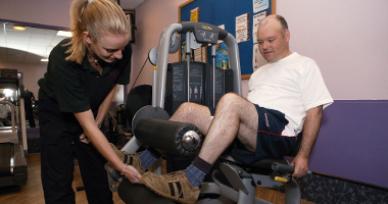Complementary medicine
Complementary and alternative medicine (CAM) refers to treatments that are not widely in use in conventional medicine, such as acupuncture and yoga. Find out more in this A-Z entry.

Treating MS can involve a range of drugs and therapies. Drugs for MS, including disease modifying drugs and drugs for treating MS symptoms, may not be suitable for everyone or available for all types of MS. However, non-drug therapies are potentially open to people with all kinds of MS.
With non-drug therapies, you work with trained professionals to support and improve your MS symptoms. These therapies may also delay the impact of progressive disease and protect your physical abilities and cognitive reserve.
The therapies listed here all have solid research evidence behind them. You can be referred for them through the NHS and your GP, although there is likely to be a waiting list. They are scientifically proven to have an effect on MS symptoms, although they may not be appropriate or effective for everyone.
You may also wish to explore complementary and alternative therapies, which many people feel have helped them manage their MS.
You will normally be shown how to perform beneficial activities by your therapist, and be given instruction on how to continue these activities after the treatment sessions. Your therapist may suggest helpful class-based exercise like yoga or pilates that complements the work they do with you in treatment sessions.
Try to stick to the recommended activity schedule and carry on with the exercises or movements you've been shown. This plays a big part in making these therapies effective. Starting this kind of therapy requires some commitment to taking control and managing your MS symptoms yourself. You are likely to get only a short course of appointments with your therapist, so it is going to be down to you to continue the process alone.
Occupational therapists (OTs) help people in the workplace or at home with lifestyle changes, adaptations or special equipment. They look at you as a whole person and find ways to make your life easier and more comfortable, and help you stay independent.
An OT might first assess your needs and then make suggestions or provide equipment. This could include helping you choose the right mobility aid, teaching you how to retain good posture to avoid pain, providing advice on adaptations for your car, or helping you move around your home safely.
Physiotherapists use physical approaches to promote, maintain and restore your physical, psychological and social well-being. This might include training you to hold your body in a comfortable way, building up your strength and flexibility, or offering therapeutic massage or stretching to improve symptoms like pain and spasticity.
A speech and language specialist can assist with improving your control of your mouth and throat. They can find ways to help you if you are experiencing problems with swallowing, speaking or other issues such as facial tremor.
If you are struggling with depression, anxiety or related issues, you may be referred to a psychological therapist of some kind. A counsellor or psychologist might offer talking therapy to help you explore and resolve you feelings about your situation. Acceptance and commitment therapy (ACT) or Cognitive behavioural therapy (CBT) are both proven approaches to help people deal with psychological problems, including people with MS.
Other rehabilitation therapists might specialise in helping with bladder and bowel issues, sexual dysfunction, or supporting you to return or remain in work.